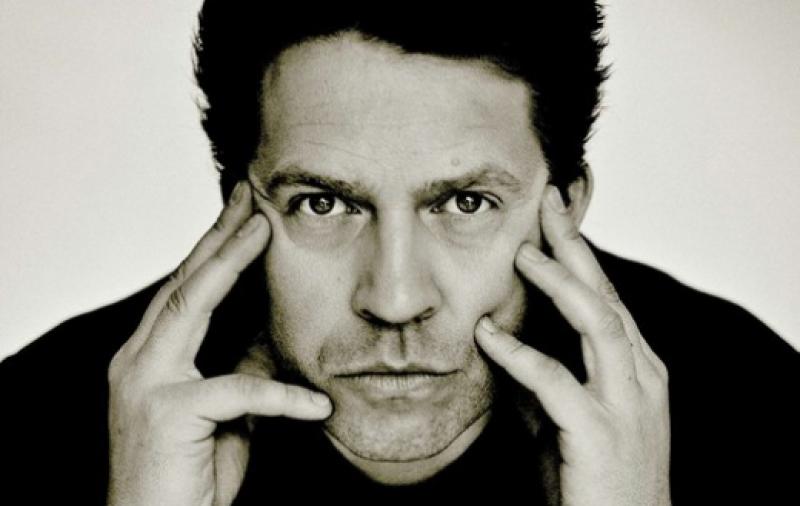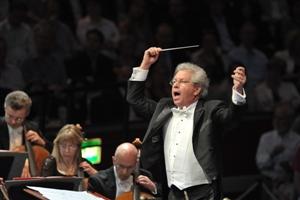Andsnes, BBCSO, Bělohlávek, Barbican Hall | reviews, news & interviews
Andsnes, BBCSO, Bělohlávek, Barbican Hall
Andsnes, BBCSO, Bělohlávek, Barbican Hall
Norwegian pianist brings a grand design to Rachmaninov, but sober Bruckner ends in disappointment

Pundits have always yoked architecture and Bruckner together, touting void and mass at the expense of the dynamic experience music ought to be. Abbado and his Lucerne Festival Orchestra favoured sinuous instability in the Fifth Symphony earlier this week, making the very foundations gyre and gimble. Relatively solid ground last night was due to a more sober conductor and Bruckner symphony: a mixed blessing.
If that meant throwing out the epic grandeur and misery favoured by the Russian school of orchestral pianism, so be it. Andsnes’s rock-solid technique was a marvel in itself, and deftly followed by Jiří Bělohlávek's velvet BBC army. It depended, apparently, on where you were sitting as to how well the balances came across: right at the back of the stalls, the piano sound pinged so insistently off the back wall that it felt as if the volume might never go below mezzo-forte, while another audience member seated some way back upstairs told me the soloist's fortissimos couldn’t be heard above the orchestra.
Such is Barbican concert life. What’s for sure is that Andsnes not only mastered the longer and more relentlessly chordal of Rachmaninov’s alternative cadenza-part-ones in the first movement – an option of which Horowitz once said, “It’s like an ending in itself, and it’s not good to end the concerto before it’s over” – but made the ensuing soft answer that turns away its wrath the lynchpin of the whole adventure, so that the movement could sink calmly to its temporary grave.
Bělohlávek’s straightforward engagement with Bruckner's Fourth Symphony made a suitable enough alternative to the still-glowing memory of Abbado in the Fifth
Least successful was the poker-faced turbulence of what sounded like a very overwrought Intermezzo, though its sudden bout of valse-tristing found Andsnes in top chamber-style partnership with the BBC Symphony woodwind. And the finale truly crowned the work, that central fantasy which so often used to get the chop making sense as a will-o-the-wisp pursuit through the forest of memory. The final cavalcade was both exhilarating and utterly in command, with a confidence that merited the ovation. Andsnes lowered temperatures graciously with a personable encore stroll through the Norwegian March of compatriot Grieg; Rachmaninov would have warmly approved.

The second-movement funeral march needs a little help, and got it; the violas shone in their disconsolate little meander and Bělohlávek lifted the whole by swinging through the first brighter processional in village-band style. But the finale has always seemed to me beyond redemption, especially last night with the miraculous solution of the Fifth still blazing in the brain; and here one really could have done with an injection of the Abbado/Lucerne hallucinogens. Instead Bělohlávek’s dogged sobriety made me want to bolt from the hall as Bruckner goes into two repeat modes too many, and with some of his dodgiest thematic material. A shame I left feeling almost as Mahler the conductor did about the piece, that the passing beauties don’t quite make up for some of the more tedious absurdities. Had composer and conductor been able to stop at the end of the big, horny Scherzo it would surely have been a different story.
Explore topics
Share this article
Add comment
The future of Arts Journalism
You can stop theartsdesk.com closing!
We urgently need financing to survive. Our fundraising drive has thus far raised £49,000 but we need to reach £100,000 or we will be forced to close. Please contribute here: https://gofund.me/c3f6033d
And if you can forward this information to anyone who might assist, we’d be grateful.

Subscribe to theartsdesk.com
Thank you for continuing to read our work on theartsdesk.com. For unlimited access to every article in its entirety, including our archive of more than 15,000 pieces, we're asking for £5 per month or £40 per year. We feel it's a very good deal, and hope you do too.
To take a subscription now simply click here.
And if you're looking for that extra gift for a friend or family member, why not treat them to a theartsdesk.com gift subscription?
more Classical music
 Scottish Chamber Orchestra, Ibragimova, Queen’s Hall, Edinburgh review - rarities, novelties and drumrolls
A pity the SCO didn't pick a better showcase for a shining guest artist
Scottish Chamber Orchestra, Ibragimova, Queen’s Hall, Edinburgh review - rarities, novelties and drumrolls
A pity the SCO didn't pick a better showcase for a shining guest artist
 Kilsby, Parkes, Sinfonia of London, Wilson, Barbican review - string things zing and sing in expert hands
British masterpieces for strings plus other-worldly tenor and horn - and a muscular rarity
Kilsby, Parkes, Sinfonia of London, Wilson, Barbican review - string things zing and sing in expert hands
British masterpieces for strings plus other-worldly tenor and horn - and a muscular rarity
 From Historical to Hip-Hop, Classically Black Music Festival, Kings Place review - a cluster of impressive stars for the future
From quasi-Mozartian elegance to the gritty humour of a kitchen inspection
From Historical to Hip-Hop, Classically Black Music Festival, Kings Place review - a cluster of impressive stars for the future
From quasi-Mozartian elegance to the gritty humour of a kitchen inspection
 Shibe, LSO, Adès, Barbican review - gaudy and glorious new music alongside serene Sibelius
Adès’s passion makes persuasive case for the music he loves, both new and old
Shibe, LSO, Adès, Barbican review - gaudy and glorious new music alongside serene Sibelius
Adès’s passion makes persuasive case for the music he loves, both new and old
 Anja Mittermüller, Richard Fu, Wigmore Hall review - a glorious hall debut
The Austrian mezzo shines - at the age of 22
Anja Mittermüller, Richard Fu, Wigmore Hall review - a glorious hall debut
The Austrian mezzo shines - at the age of 22
 First Person: clarinettist Oliver Pashley on the new horizons of The Hermes Experiment's latest album
Compositions by members of this unusual quartet feature for the first time
First Person: clarinettist Oliver Pashley on the new horizons of The Hermes Experiment's latest album
Compositions by members of this unusual quartet feature for the first time
 Gesualdo Passione, Les Arts Florissants, Amala Dior Company, Barbican review - inspired collaboration excavates the music's humanity
At times it was like watching an anarchic religious procession
Gesualdo Passione, Les Arts Florissants, Amala Dior Company, Barbican review - inspired collaboration excavates the music's humanity
At times it was like watching an anarchic religious procession
 Classical CDs: Camels, concrete and cabaret
An influential American composer's 90th birthday box, plus British piano concertos and a father-and-son duo
Classical CDs: Camels, concrete and cabaret
An influential American composer's 90th birthday box, plus British piano concertos and a father-and-son duo
 Cockerham, Manchester Camerata, Sheen, Martin Harris Centre, Manchester review - re-enacting the dawn of modernism
Two UK premieres added to three miniatures from a seminal event of January 1914
Cockerham, Manchester Camerata, Sheen, Martin Harris Centre, Manchester review - re-enacting the dawn of modernism
Two UK premieres added to three miniatures from a seminal event of January 1914
 Kempf, Brno Philharmonic, Davies, Bridgewater Hall, Manchester review - European tradition meets American jazz
Bouncing Czechs enjoy their Gershwin and Brubeck alongside Janáček and Dvořák
Kempf, Brno Philharmonic, Davies, Bridgewater Hall, Manchester review - European tradition meets American jazz
Bouncing Czechs enjoy their Gershwin and Brubeck alongside Janáček and Dvořák
 Solomon, OAE, Butt, QEH review - daft Biblical whitewashing with great choruses
Even a top soprano and mezzo can’t make this Handel paean wholly convincing
Solomon, OAE, Butt, QEH review - daft Biblical whitewashing with great choruses
Even a top soprano and mezzo can’t make this Handel paean wholly convincing
 Two-Piano Gala, Kings Place review - shining constellations
London Piano Festival curators and illustrious friends entertain and enlighten
Two-Piano Gala, Kings Place review - shining constellations
London Piano Festival curators and illustrious friends entertain and enlighten

Comments
It was indeed a pleasure to
One wouldn’t wish to welcome